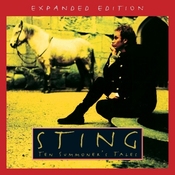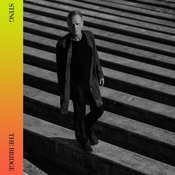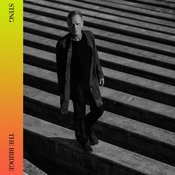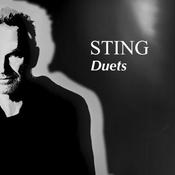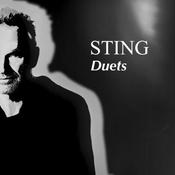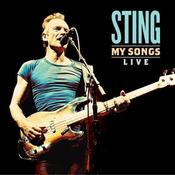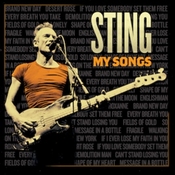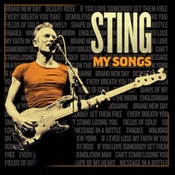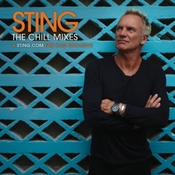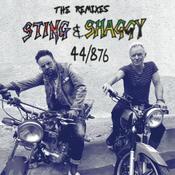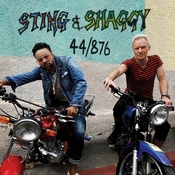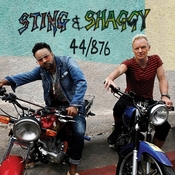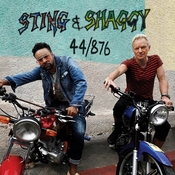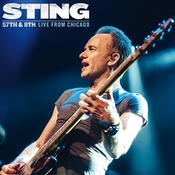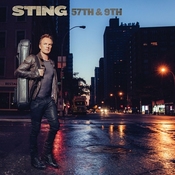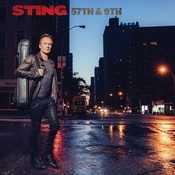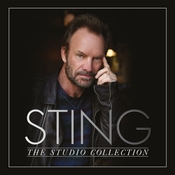The Dream of the Blue Turtles

Soundbites
"Following the massive success of 'Synchronicity', I decided to set out on my own. This decision, I admit, was not particularly logical. In the eyes of some it was the highest folly to leave what was arguably the biggest band in the world at that time. Of course it was a risk, but I can only say that I listened to my instincts, no matter how irrational they seemed to everyone else, and then followed them, fully aware that falling flat on my face was a very real possibility. I ignored this as much as I could, believing that the momentum of the band had been such that people would at least be curious about what I was up to. I have to say the sense of freedom in not having to tailor songs to accommodate a three-piece, even one as versatile as the Police, was like opening a window in a closed room. Although I believed that the Police had thrived on the limitations of being a small band, I was more than ready after seven years to fly the coop."
Sting, 'Lyrics', 10/07
"With the help of my friend, the writer and critic Vic Garbarini, I recruited a band of young jazz musicians, including alumni of Miles Davis's band, Art Blakey's band, and Weather Report. Branford Marsalis would play saxophone, with Kenny Kirkland on piano. This caused some friction with Branford's brother Wynton, who, apart from losing two of his band, thought they were selling out by playing with a pop musician like myself. Nevertheless, we all set out for Eddie Grant's studio in Barbados with a bag full of new songs and a mission to start a new adventure."
Sting, 'Lyrics', 10/07
"The title of the album came from a dream that woke me up on my first night in Barbados. I dreamed I was sitting in the walled garden behind my house in Hampstead, under a lilac tree on a well manicured lawn, surrounded by beautiful rosebushes. Suddenly the bricks from the wall exploded into the garden and I turned to see the head of an enormous turtle emerging from the darkness, followed by four or five others. They were not only the size of a man, they were also blue and had an air of being immensely cool, like hepcats, insouciant and fearless. They didn't harm me but with an almost casual violence commenced to destroy my genteel English garden, digging up the lawn with their claws, chomping at the rosebushes, bulldozing the lilac tree. Total mayhem. I woke up to the sound of Branford in the room upstairs, riffing wildly on his tenor sax, followed by his unmistakeable laughter."
Sting, 'Lyrics', 10/07
"There's as much excitement about the record in the record company as there would be for a Police record, which is quite thrilling. It's not Oh, Sting's got to have his little hobby, humour him and let him make his jazz record."
Sting, NME, 6/85
"This new band is more clearly defined. I hired them to play, and I'm the songwriter and singer. So there are no arguments about roles, which makes the process a lot easier. But there's still room for the dialectic to and fro. They're not sidemen, they're too good for that. It was my intention all along to have a band, not a super-session bunch of hirelings. They're too proud to be that, and I'm too clever to want that. I didn't want to be seen as a patrician white pop star with his minstrel band. That's not the idea..."
Sting, NME, 6/85
"It wasn't my intention to draw comparisons between the Police and this record, I'm just playing with different musicians. It's as simple as that. I'm not intimidated by great players. On this record I've recruited some of the best young players in America but I think I'm the best songwriter, so I'm not being immodest, the band has a good pedigree, and I'm part of the pedigree. I didn't do this out of any dissatisfaction with the Police. I needed to change. When you've been together eight years, there are no surprises."
Sting, The Courier Mail (Australia), 7/85
"First of all there's Branford Marsalis, who isn't good at anything. Then there's Omar, who thinks he's a good drummer but really he's nowhere as good as me. But I like him. Then there's Darryl, whom I'm trying to teach to play the bass. He's kind of cute. Finally there's this joker called Kenny Kirkland who sounds as if he's playing with boxing gloves on. It's a pretty good band."
Sting, Musician, 7-8/85
"The four blue turtles are the four musicians in my band. They're a good symbol: The turtle is a creature who lives both under the sea and out of it. The sea is a good symbol of the subconscious. I feel black people are closer to that unconscious and blue is a good colour for jazz musicians anyway. What they're doing is destroying my safe formula, my safe back yard. They're wrecking that safety, that formularised easy option, which is making a Police record. Churning up the land is what a farmer does when he wants it to be fruitful a year hence. In many ways it's a confirming dream. Yes, it's frightening and dramatic, but ultimately you'll be rewarded."
Sting, Los Angeles News, 6/85
"The album certainly would have been different with Andy and Stewart. You'd know exactly what to expect and how it would sound. Once you're in a successful group you become part of people's gestalt, and you're not allowed to escape from it. Freedom is everything to me - freedom to change my mind, freedom to be seen differently. The more people pigeonhole me the more my freedom is impaired. I want to be able to change what I do. I get bored very easily. My threshold for boredom is very, very low."
Sting, Record, '85
"It's not a concept album. There's no consistent theme running throughout - but there's also no song on the record that doesn't have an issue. It's not just a riff of a guitar with nonsense lyrics. A lot of thought and energy went into it. The songs are more didactic than they've ever been before. I have to be inspired before I write, but then when you're writing about issues like the miners' strike, the proliferation of nuclear power, and the arms race, then you have to have a certain responsibility to those issues. You have to think about them. I think time is running out. You can't really make records that are about nothing anymore."
Sting, Record, '85
"I think it's my best work, the most refined piece of work I've done. And I'm proud that it's not going to be easily formularised. It's not going to fit terribly well on radio formats, for example. But I'll be intrigued as to how they treat it. The whole idea is to keep people confused, because that allows you freedom. As soon as they're sure about who you are and what you're gonna come up with next, then you're dead, stagnant and useless - which is why rock & roll is dead; I know what MTV is going to look like today. I don't want to be in that kind of prison. I like people to go, "What the fuck is that boy gonna do next"
Sting, International Musician, '85
"I'm very pleased with the record. It's live, it's obviously played by musicians and not by machines - in fact, it's rough as hell - and yet it satisfies a lot of ingredients that needed to be satisfied in order for it to be a commercial record. And I wanted it to be as commercial as possible."
Sting, International Musician, '85
"Darryl is one of those bass players who started to play the bass. I was a guitarist first, then a double bassist, then, at about nineteen, an electric-bass player. Darryl has a very pure approach to bass playing. However, there are some things, I'm happy to say, I did on the album; I played the reggae/calypso song, 'Love Is the Seventh Wave'. I played on 'Fortress Around Your Heart', only because I was writing it in the studio, and basically I just put down the bass straightaway and it seemed fine, so I kept it on. And I also played double bass on 'Moon Over Bourbon Street'. So I did play some of the bass, but the motherlode of the work was done by Darryl, largely because he's just a wonderful player and can do things I can't. And I'm not precious about my ability as a musician. I think that my function in this group is as a concept organiser. I'm working with musicians who are technically much, much better than I am."
Sting, International Musician, '85
"These musicians, who were all ten years younger than me and middle-class blacks at that, did things so naturally and so easily. I found the way they played and learned to be incredibly stimulating. It opened me up a bit. Here I m not sure what my position is. Am I the patrician white rock star Or am I the novice I really had to assess what I was."
Sting, Timeout, 10/87
"Jazz musicians are forced to play standards. I wanted to give them a new springboard. I provided the lyrics, the harmony and melody for them to explore. The first album was a new position for me. I'd left the Police, I felt like a duck out of water. There Is a lot of nervous energy in it."
Sting, Sky Magazine, 11/87
"It was a band in as much as what they were good at playing; and as jazz musicians, they were used to composing or arranging on the spot. It was a band in the sense that they were allowed to do that. I had arrangements and we worked from there. They were allowed input to play what they wanted, as long as I liked it. On the live album, I paid the band royalties, because I thought a lot of the stuff was theirs too. So we shared the royalties."
Sting, Musician, 12/87
"It wasn't my intention to draw comparisons between the Police and this record, I'm just playing with different musicians. It's as simple as that. I'm not intimidated by great players. On this record I've recruited some of the best young players in America but I think I'm the best songwriter, so I'm not being immodest, the band has a good pedigree, and I'm part of the pedigree. I didn't do this out of any dissatisfaction with the Police. I needed to change. When you've been together eight years, there are no surprises."
Sting, The Courier Mail (Australia), 7/85
"Let me explain. During the week of rehearsals for the Ritz shows, I had a dream that I was back home in Hampshire, looking out the window into this big walled-in garden I have out back with its very neat flower bed and foliage. Suddenly, out of a hole in the wall came these large, macho, aggressive and quite drunk blue turtles. They started doing back- flips and other acrobatics, in the process utterly destroying my garden. So anyway, I'm somehow enjoying this curious spectacle, and the dream is so strong I remembered it perfectly when I woke up, to the point where it became part of my juggernaut to complete this record. Having undergone Jungian analysis, I've gotten proficient at interpreting my own dreams, Carl Jung; having believed that there're doors into the innermost parts of your psyche. For me, the turtles are symbols of the sub-conscious, living under the sea, full of unrealised potential, very Jungian in their meaning. I have dreams where I create the most unbelievable music, music like Mozart, that I don't consciously have the knowledge to write. It's there, I'm writing it, and it's real. So with the album I wanted to destroy a lot of preconceptions and expectations, and do something unsettlingly different. These blue turtles, these musicians, were gonna help me. And they did."
Sting, Spin, 7/85
"Pop music at it's best is a great mongrel, taking in sources from everywhere. I think pop music was at it's best in the '60s, when there were no barriers, no demarcation lines of jazz, classical, whatever. So, I wanted to inject some of that dialectic into this project, and I managed to get the best young jazz musicians in the country. They all wanted to do it, which I think is a great tribute to me, because they don't particularly like rock music. But also, I didn't want to make a jazz album. I wanted to stretch myself, I wanted to be challenged by what they could do, and I also wanted them to stretch too. I don't think they found it particularly easy, and I was very demanding about what I wanted. I didn't want them to just slip into their jazz mould and go off and do what they can do falling off a log."
Sting, International Musician, '85
"I'm not really interested in the spirit of rock & roll. I don't know what rock & roll is, or if it's valid anymore. I'm interested in the spirit of live music, and I don't think Branford, Omar, Kenny, Darryl or myself miss the spirit of rock & roll at all. I think we're right in there, and I would hereby challenge any band to blow us off stage!"
Sting, International Musician, '85
"I composed a lot of the songs on keyboard anyway, so those basic parts were already written. I didn't write any sax part as such; I trusted Branford to come up with my vision of it. Like, for 'The Children's Crusade', I said, "I want something that's kind of military," and he played something that was totally, utterly appropriate. He wouldn't be improvising just with the changes and the chords, he'd be improvising with the lyrics, and you can hear it in the sensitivity of his playing."
Sting, International Musician, '85
"Basically, the whole project was designed to create a new kind of hybrid that was neither rock'n'roll nor jazz, but was hopefully another country - another country that I'd have to make a journey to, just as the band did. So we don't play like Weather Report or Miles Davis - but neither are we going to sound like uh, Van Halen! Or the Police!"
Sting, The Charlotte Observer, 10/85
"There was never any intention of it being a jazz record. That was an easy label that journalists put on it. It wasn't marketed that way. It has some flavour of jazz, hopefully the sensibility of jazz. I'm not that interested in jazz to produce a jazz record. I'm interested in selling songs. We got a jazz Grammy nomination for the album. Thank God we didn't win. That would have been too much."
Sting, Musician, 12/87
"Blue Turtles had songs on it that I thought would never get on the radio, but because I was in such a position of power it was a challenge. A song like 'Bourbon Street' was a massive hit in Europe; 'Russians' was in the Top 20 here. I put this on the record and thought, "This is really going to put the cat among the pigeons - how are they going to play it in their format" And they did. I think it's my duty to use the power to, if not revolutionise it, then push the boundaries of what they're willing to play."
Sting, Musician, 12/87
"Dream was more about a band meeting a pop star. That's what the album's about, going through that filter. I didn't want to extend what the Police had done because that would have sounded like a Police album. It was something we really didn't think about. We knew about space, less is more, and simplicity. We didn't really think about "Let's play that chord here." It wasn't a philosophical thing."
Sting, Musician, 12/87
"It's a song selection, rather than an album that sounds like a unified piece of work. If I have to look for a blueprint for what I hope to do, it's probably 'The White Album' by the Beatles, which was about songs. It wasn't about a group of songs or a direction at all, it was about 'Rocky Raccoon' and 'Why Don't We Do It In The Road' and 'Birthday', so the individual songs drive it. I've never been into having this "sound." My idea is to have this body of work, and every album I just add to it; it's not like each is a separate chapter. I hope I'm getting better at what I'm doing, but I'm just trying to add to what I've done. The modern pop song form was becoming narrow and formulaic again by the time of Blue Turtles, but you felt it could have jazz in it, a Caribbean lilt, and more substance rhythmically and thematically. I needed to exorcise the Police, which in a way had a defined form and structure. I wanted to escape that and present a whole plethora of possibilities. 'Blue Turtles' does that - it's all over the place, and by some definitions, that's not a unified piece of art. But for me it was just a banner, saying, "Here, I can do this! I can fly here, I can fly there, up, down, go sideways!" That was me exercising my freedom.
Sting, Billboard, 9/99
"In this band, the roles were very clear. I hired the musicians and my function was to sing and to write the songs. I have the advantage, Andy and Stewart are forced to go into more esoteric areas, which obviously doesn't have as much commercial cachet as a guy singing songs. I'm probably in the top five commercial song writers in the world, so I am assured some kind of guarantee of success. Let's face it, the bigger the hit the more pleased I'll be."
Sting, The Courier Mail (Australia), 7/85
Backgrounder
Review from Rolling Stone magazine by Jon Pareles
With the Police on hiatus, Sting had choices galore for ways to make his inevitable solo album. The most obvious was to become the world's best-qualified Police imitator; what he did instead smacks of brilliantly enlightened self-interest.
Der Stingle chose to form a new band with young jazz hotshots from Weather Report (drummer Omar Hakim) and the Miles Davis group (bassist Darryl Jones), plus saxophonist Branford Marsalis and keyboardist Kenny Kirkland. These aren't the usual sleepy gang of veteran sidemen; they never bothered to learn pop-jazz cliches, but they know their Jimi Hendrix, Chic, Herbie Hancock and Led Zeppelin, along with their Duke Ellington.
Unlike Joni Mitchell another Big Blond Star who attempted this kind of jazzification, Sting can swing. You can hear how much fun he's having, and how much goosing he gets from the band, in the remake of the Police's Shadows in the Rain. The spooky, dubwise reggae tune from 'Zenyatta Mondatta' now steams along like a workout by soul-jazz organist Jimmy Smith. Kirkland pumps out organ chords over Hakim's stomp, while Sting and Marsalis dodge each others' syncopations around the bass line.
But except for Shadows, the bluesy 'Consider Me Gone' and an instrumental, 'Blue Turtles', that grafts progressive 1960s jazz onto a Weather Report march, 'The Dream Of The Blue Turtles' is a pop record above all. It's only a jam session between the lines, where Marsalis answers Sting's voice with slyly ubiquitous fanfares and curlicues and epigrams.
Sting still writes short, modal melody lines, and sometimes he plays around with the Police's quiet marches (ala King of Pain) and Afro-Anglo-Caribbean rhythms - to do anything else would be like changing his fingerprints. But if you listen to the way verses and phrases end, there are new twists, surprising extended chords by way of Steely Dan, Weather Report and Ellington. Although Sting is working with world-class improvisers, many of his new band's arrangements are more structured than tracks by the Police. That amazing trio could juggle rhythm and lead roles like nobody's business, while a quintet that tried the same openness would find itself in chaos. The new band is also punchier than the Police, because Kirkland's keyboards - especially the organ - reinforce the rhythm, and the Hakim/Jones team packs a mighty wallop.
Solo albums are traditionally variety shows and statements of purpose, and 'The Dream Of The Blue Turtles' is a little of both. Sting delves into neo-vaudeville with 'Moon Over Bourbon Street' and seriouso classical hymnology with 'Russians', a disarmament song. He also comments on the British miners' strike ('We Work The Black Seam') on lost generations ('Children's Crusade') and on matters philosophical and epistemological ('Love Is The Seventh Wave' and 'If You Love Somebody Set Them Free').
When I saw the band in concert (as you should when it tours this summer) its musical exuberance was contagious: I kept losing track of the lyrics in the brainy kicks of the music. On record, things are a little more sober - and, to my taste, too earnest.
It was easy to see it coming. Sting has been driven to tears by world problems since the Police's third-world tour. Yet I'd suspect that the rest of the band edited his pronouncements for commercial zoning; without them, he does tend to go on about "All the bloodshed all the anger / All the weapons all the greed / All the armies all the missiles / All the symbols of our fear," as he does on 'Love Is The Seventh Wave'.
'Children's Crusade' makes a rather tenuous connection between soldiers in World War I and young drug users. 'We Work The Black Seam', - with a winding melody chat suggests climbing and descending and with a rhythm track like the clang of picks - extrapolates from neat denunciations of Thatcherism ("We matter more than pounds and pence / Your economic theory makes no sense") and nuclear power ("Bury the waste in a great big hole") to goofy stuff about the universe. Sting acts worried about carbon 14, which must be easier to rhyme than plutonium.
I'm all for political songs, and there's no better vehicle for them than a megastar album. Yet Sting sabotages good intentions when he gets preachy or spacey or sanctimonious. 'If You Love Somebody Set Them Free' is a postgrammatical, T-shirt sentiment and a denunciation of possessiveness that would be a lot more convincing issued by someone other than a millionaire. If Sting really believes that we can be happy with less, he can send me 0,000 care of this magazine.
So dump the lyric sheet and enjoy the tunes: the transparency of 'We Work The Black Seam', the way 'Children's Crusade' slowly spirals to its climax, the Caribbean lilt of 'Love Is The Seventh Wave', the impassioned singing on If You Love Somebody Set Them Free and the delicate-to-martial dynamics of 'Fortress Around Your Heart', which evokes Pete Townshend and Steely Dan, along with the Police. Sting the musician has more to say than Sting the deep thinker - especially when he's paced, and pushed, by extraordinary young musicians.
Review from The Sydney Morning Herald by Henry Everingham
Do you remember love songs? "Real" love songs. You know? The ones with music sounding like it came from some tacky musical and lyrics that contained at least a dozen "babys" - not to mention the obligatory "if you leave me, I'll drive Dad's car over Niagara Falls" sentiment.
Well, those songs are still out there, somewhere. Only we don't hear them so much any more, because for the last seven years, the Top 40 has been ruled by Sting, and his immensely popular band The Police.
Not that Sting doesn't write love songs. Indeed he does. But the subject of his love songs is not your average cheated-teenage-sweetheart. His subjects tend to be prisoners in chains and dominating beasts, all thrown in with a liberal dose of Jungian theory. Even in The Police's hit 'Wrapped Around Your Finger', Sting denied being Mephistopheles. (How many spotty-faced kids out there watching Countdown know who Mephistopheles is?)
If that's the kind of music that turns you on, then you'll be thrilled to learn that Sting has released his long awaited solo album. However, first things first. Despite all the guff you may have heard about 'The Dream Of The Blue Turtles' being a jazz inspired album, forget it. Certainly, he has employed a variety of musicians with solid backgrounds in the vein of Weather Report, but it is still basically Sting's style of pop music. And naturally, it still sounds like The Police. What made that band sound so good was not so much their deft musical style, but Sting's rasping lead vocals.
Still, 'The Dream Of The Blue Turtles' is one remarkably fine album. I (and no doubt many others) had thought Sting had reached his pinnacle with the last Police album, 'Synchronicity', but he has proved us wrong and returned with a collection of rather daunting songs dealing mainly with relationships and that now perennial favourite, war.
Review from Billboard magazine
Perhaps the most anticipated release of the summer, and the wait proves well worth it: Police vocalist/bassist's solo collection features 10 tunes, and not a throwaway in the batch. First single, 'If You Love Somebody, Set Them Free', is already a hit, and 'Fortress Around Your Heart' appears to be lined up as the second single. But aside from raising an eyebrow towards the charts, Sting's album has to be admired for its strong identity and wealth of ideas. The Monkish title tune and ambitious compositions like 'We Work The Black Seam' and 'Moon Over Bourbon Street' are the work of an original artist. First class.
Review from The Miami Herald by Tom Moon
Using opium as the connecting image, a historian draws sharp parallels between the loss of young life during World War I and drug abuse today. Unemployed coal miners mourn the onslaught of a sophisticated and frightening power supply: "One day in a nuclear age, they may understand our rage/Build machines that they can't control, then bury the waste in a great big hole." A concerned citizen, frustrated by the cumbersome rhetoric of U.S.-Soviet detente, says with cautious resignation: "I hope the Russians love their children, too."
This cast of characters comes from the debut solo project by Sting, bass-playing leader of the rock trio The Police, scheduled for nationwide release today by A&M records.
'The Dream of the Blue Turtles' is a collection of 10 somewhat-experimental, fiercely focused pop compositions performed by a crack team of young jazz talent. It is not the new Police album, though at first it is hard not to imagine Andy Summers and Stewart Copeland supporting the fiery-voiced Sting (a.k.a. Gordon Sumner) with their trademark minimalist accompaniment.
But since 'Dream' is an extension of his development as a songwriter, Sting has appropriated a more personalized sound to compliment it. The goal, he has said, was to forge a connection between rigid pop formulas and the creative spark of improvised music. Like a chemist confident of his materials but unsure how his experiment would turn out, Sting took chances.
It worked.
For this experimentation he hired saxman Branford Marsalis and keyboardist Kenny Kirkland - both from the ranks of mainstream jazz artist Wynton Marsalis' band. Miles Davis' current bassist, Darrell Jones, was enlisted; his rhythm section partner is Weather Report drummer Omar Hakim.
Sting, whose resume looks almost lightweight by comparison, plays jangling rhythm guitar and Synclavier synthesizer, but his voice is the focus of attention throughout - in growling, soaring lead lines as well as loosely structured background roles. He plans to tour with this band this summer and is filming an hour-long documentary to trace the evolution of the project. 'Dream of the Blue Turtles' is clearly Sting's new thing.
It catches the singer/songwriter moving away from the fleeting images of Syncronicity toward sustained, long-view scenarios reminiscent of musical theater. 'Moon Over Bourbon Street', a recasting of the standard Autumn Leaves, might be called "Confessions of a Wayward Vampire." The opening R&B raveup, 'If You Love Somebody Set Them Free', works as a companion to the Police hit 'Every Breath You Take': Here the obsessed lover has learned what it takes to keep a relationship alive and is happy to dispense the advice. Then 'Fortress Around Your Heart' cloes the album with a fantastical allegory on the risks of past mistakes.
Though Sting's poetry has become more detailed and immediate, it is not necessarily any more revealing. A deliberate air of mystery surrounds compositions such as the steel-drum flavored 'Love Is The Seventh Wave' and the cool 'Consider Me Gone': At every turn the churning instrumental interaction help shadow the true intention of his lyric. Only two compositions ('Set Them Free' and 'Shadows In The Rain') break out of the languid, medium-tempo mold Sting has cast; this similarity is the album's biggest weakness.
Throughout 'Dreams', Sting adapts the manner of an expert bandleader, allowing his sidemen to do what they do best: drummer Hakim shoots for a steady, crisp pulse dusted with cymbals - gone are the abrupt polyrhythms Copeland used as punctuation. Marsalis' job is to add a soulful edge where Sting has neglected it, and his soprano sax is a vital element on 'Love Is The Seventh Wave' and 'Children's Crusade'. Kirkland's synthesizers provide orchestrally thick padding, though the pompous Slavic theme of Russians would have been better served by an authentic brass choir.
By sandwiching experimental numbers such as 'Children's Crusade' and the title track between more conventional, pop-oriented material, Sting has created a coherent, seamless work bonded by a sense of looseness. There are moments of ecstatic music here: the shrill, almost panicked chorus of 'We Work The Black Seam', Sting's evenly measured vocal crescendos on Fortress. As the primary architect for The Police, Sting developed a sound that was urgent and irresistible. Now he delicately alters the proportions in order to further personalize his solo concept, and the result is a bold "fusion" worth noting.
Review from The Washington Post by J D Considine
Pop idols aren't exactly known for taking risks, throwing their audience curve balls or walking away from sure things. Yet that's exactly what Sting has done with 'The Dream of the Blue Turtles', his solo debut.
Unlike the outside projects of his cohorts Stewart Copeland and Andy Summers, this is no mere Policeman's holiday, for what Sting has attempted is a marriage of pop and bop that pushes beyond the traditional notion of fusion music.
Rather than try to mix and match the two styles, Sting works a middle ground that leaves room enough for a walking bass and aggressive solos and, at the same time, sticks plenty close to the melody. On the best material - 'If You Love Somebody Set Them Free', 'Childrens' Crusade', and 'Fortress Around Your Heart' - Sting supplies swing and sophistication without losing the melodic appeal that powers The Police's best work.
Unfortunately, that balance is not maintained throughout the album. Sometimes, saxophonist Branford Marsalis and keyboardist Kenny Kirkland seem unnecessarily constrained; at others, the listener yearns for the music to break free. Drummer Omar Hakim is a powerhouse player, but lacks the polyrhythmic fluidity Stewart Copeland uses to lighten The Police sound. Add in Sting's tendency to preach ("There is a deeper world than this/That you don't understand" from 'Love Is the Seventh Wave'), and 'The Dream of the Blue Turtles' ends up an only partly successful experiment.
Review from People magazine
The lyrics are penetrating enough to make you think of Yeats. The voice sounds like a more thoughtful Rod Stewart. The music is an unpredictable combination of rock, jazz and socially conscious folk. The man behind this remarkably passionate, thoughtful album is, of course, on leave from the Police. But nothing the Police have done - as entertaining as the group is - could have prepared anyone for this distinctive album. The songs, all written by Sting, are filled with allusions to nuclear war, pollution, despair and other concerns of our era. In the reggaeish 'Love Is the Seventh Wave', he sings of "All the bloodshed, all the anger/All the armies, all the missiles." In 'Consider Me Gone', he comments, "The search for perfection is all very well/But to look for heaven is to live here in hell." Sting avoids pretension with bitingly energetic and wide-ranging music. There are splendid contributions from keyboardist Kenny Kirkland and especially saxophonist Branford Marsalis, whose solos offer annotations to the lyrics. Sting also demonstrates a sly sense of humor. He ends 'Seventh Wave' with a comment on a Police pop hit, idly singing, "With every breath you take/Every move you make/Every cake you bake/Every leg you break." His more serious moments are impressive too, as in the evocative 'Moon Over Bourbon Street': "The brim of my hat hides the eye of a beast/I've the face of a sinner but the hands of a priest." This album will set minds to spinning and toes to tapping. It adds a new dimension to the fierce appeal of its creator.
Review from The Times by Richard Williams
To his great credit Sting has opted in his first solo album for the spontaneity that has made the Police an exceptional group. 'The Dream of the Blue Turtles' may well have cost as much as the half a million pounds that it took Bryan Ferry to piece together Boys and Girls, but it certainly does not give that impression. All the 10 tracks sound as though they were recorded by a small group of musicians playing together at the same time, exploring material undulled by over-familiarity, mixed on to tape more or less as they stood.
This, presumably, is what Sting was after when he drew into the project young American jazz musicians of the calibre of Branford Marsalis (saxophones), Darryl Jones (bass), Kenny Kirkland (piano) and Omar Hakim (drums). To ask such men to overdub on rhythms set by electronic drums and synthesizers would be like inviting one of the Roux brothers to pour the tomato ketchup over your Big Mac.
The best of this music jumps and flows with pronounced rhythmic vivacity, notably the first single, 'If You Love Somebody, Set Them Free', the slinkily jazzy 'Consider Me Gone', and the burstingly melodic 'Fortress Around Your Heart', which builds through a rather shapeless verse to its indelible chorus in the best tradition of the Police. On the rowdy 'Shadows in the Rain', young Marsalis sounds both amused and pleased by being asked to impersonate Clarence Clemons, a task he achieves with honours.
The worst of it meanders in a dream, grasping at Sting's own cliches - the melodies of 'Russians' (despite its acknowledged borrowing from Prokifiev), 'Children's Crusade' and the streamlined reggae of 'Love is the Seventh Wave' - and grappling inconclusively with Big Themes. For all its careful craftsmanship, even the already celebrated 'We Work the Black Seam', his impassioned defence of the miners' strike, lacks the mysterious dimension that turns propaganda into art.
Review from Newsweek magazine by Jim Miller
'The Dream of the Blue Turtles' is the latest excursion in Sting's ongoing crusade to break down the barriers between different types of music. With the Police, he dabbed first in punk rock and then in reggae, slowly developing a distinctive voice and style. By 1983 and Synchronicity - the fifth and best Police album - the style was complete. Carefully layering different musical tracks in the studio and using synthesizers to create ostinato figures, chiming tones and orchestral textures, Sting seamlessly blended Slavic melodies, modal scales and African and Caribbean rhythms into a kind of high-tech global folk music.
Now, in his first solo recording, Sting has gone in a different direction, recruiting four gifted younger jazz players in an effort to reinvent his musical synthesis. He is scarcely the first person, of course, to attempt a fusion of jazz and rock. Organist Bill Doggett, who once played with the big band of Lucky Millinder, did it in 1956 with 'Honky Tonk'. More recent - and self-conscious - examples include Herbie Hancock, Joni Mitchell and the currently popular British singer Sade. The most artistically successful of these recent fusions, the jazz-based band Weather Report and the pop group Steely Dan, succeeded in part because they largely eschewed improvisation, swing and the three-chord simplicities of traditional rock in favor of angular riffs and pastel tone poems.
Though Sting follows a similar approach, it works only fitfully. Confined within tight arrangements, his musicians rarely have a chance to cut loose. Even so, the players get their licks in. Keyboard player Kenny Kirkland contributes fleetsizer choruses made to sound like a slippery celeste, but the real standou is saxophonist Branford Marsalis. He quietly shines throughout, playing obligatos, often on soprano sax, with a terse eloquence reminiscent of Weather Report's Wayne Shorter (who once helped out Steely Dan in similar fashion).
Too Clever: As a composer, Sting is nothing if not resourceful. Like much of his writing, 'Russians' is too clever by half, but puts its Prokofiev theme to wonderfully atmospheric use. 'Moon Over Bourbon Street' is a floating lament. 'Children's Crusade' skillfully evokes the appropriate mood - the sound of distant bells is a typical touch.
One of the most striking aspects of Sting's music remains his singing. Despite its thiness, his tenor has an attractively sandy grain, given texture by his deft use of growls, falsetto and the full range of modern recording techniques, from phasing and filtering to overdubs and reverb. On some ballads his voice seems to hang in the air like mist. And when he lights into the right kind of song - 'Every Breath You Take' or 'If You Love Somebody Set Them Free' - he manages to enliven even his most studied hits with a flash of real feeling.
Review from The Los Angeles Times by Matt Damsker
Sting has gotten over his king-of-pain obsessiveness: "If you love somebody," he sings on the lead track of his first solo album, "set them free." And so he sets a generous tone. And lovingly, he frees us of the Jungian densities and pathological tilt of the last Police album, 'Synchronicity', and its arch-possessive ballad, 'Every Breath You Take'.
On 'The Dream of the Blue Turtles', the Police chief voices a clear, anti-war, global valentine amid a boggling array of polished, passionate yet subtly insinuating tunes. This is music fully liberated from the three-man reggae-pop cage of the Police. Instead, Sting meshes with a jazzy four-man group: drummer Omar Hakim, bassist Darryl Jones, keyboardist Kenny Kirkland and saxophonist Branford Marsalis, whose precisely inspired lyricism carries the album's wealth of mood.
Marsalis is a star attraction, certainly, yet the album is no less Sting's triumph. The sharp tenor slap and grainy croon of his vocals have never been more expressive or varied, and his stylistic depth is evident at each turn. The aggressive R&B charge of 'If You Love Somebody Set Them Free' yields to the congenial reggae of 'Love Is the Seventh Wave'. The naively beautiful 'Russians', in which Sting salves his nuclear fears with a "hope the Russians love their children too," swells with a synthesized snatch of Prokofiev.
Then comes 'Children's Crusade', a mournful look back to World War I ("Poppies for young men/such bitter trade... all for a children's crusade") that equates its legacy with the drugged hopelessness of Britain's modern youth, Marsalis' horn an elegiac underscore. Here, as elsewhere on the album, the sense of a strongly sympathetic collaboration between gifted players is profound. On 'Shadows in the Rain', a full-tilt boogie propels the track - a whiskey-voiced hangover tale - into that rare realm where singer, song and band are thoroughly loose yet perfectly balanced.
Side 2 opens with an extraordinary ballad, 'We Work the Black Seam', which builds on a minimal five-note figure and Marsalis' atonal accents. The song laments the deadly byproducts of the nuclear industry from the angry, unsung viewpoint of mine workers ("One day in a new clear age/they may understand our rage/Build machines that they can't control/and bury the waste in great big hole...").
But there's a lighter touch here as well. 'Consider Me Gone' is a bluesy, lounge-jazz kiss-off of a love affair, while the album's title track instrumental is a slice of pure improvisational joy, echoing Brubeck. And 'Moon Over Bourbon Street' - inspired by Anne Rice's novel, 'Interview With the Vampire' - has the timeless sound and perfect melody of a pop standard, as Sting's double-bass paces an arrangement that hints of an infernal Mardi Gras and his voice superbly enacts the tale of an ambivalent bloodsucker.
Even hard-core Police fans will respond to the album's closer, 'Fortress Around Your Heart', which kicks in a stirring rock chorus and cements the album's theme of building bridges with love and reassessment. Yet there's not a hint of pandering about this album. There's continuity enough between Sting's Police record and this solo blotter, but when he coyly fades out one song with a joking reference to "every move you make, every cake you bake," it's clear that he's found a higher emotional and broader musical ground.
Without losing sight of the pop audience, Sting has delivered a brilliant, uncompromised fusion of pop and jazz. It manages to transcend the self-centered "solo album" format with every collective breath it takes.










